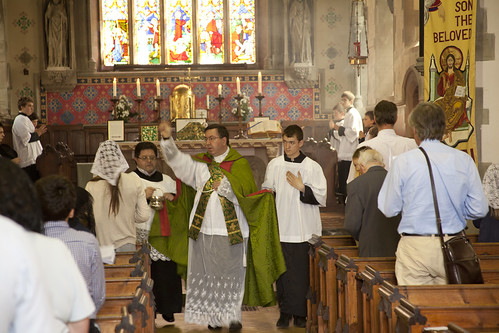 |
| Asperges me: the ceremony of sprinkling with holy water, before a Sung Sunday EF Mass. At the Summer School last Sunday, celebrated by Fr Andrew Southwell. |
This may not seem a question of much practical import, but it is an interesting question of principle. Are there restrictions on the Traditional Mass which don't apply to the 1970 Missal? The answer, in our view, is that SP 5.2 is permissive, not restrictive.
Here is the central point of our response.
Does this place a restriction on the number of Extraordinary Form Masses which can be said on Sundays? The Vatican Information Service translation, on the EWTN website, gives this:
Celebration in accordance with the Missal of Bl. John XXIII may take place on working days; while on Sundays and feast days one such celebration may also be held.
At first glance this appears to place a limit on the frequency of EF Masses which does not exist for OF Masses. But this is not, in fact, accurate. Following the advice of the Latin Mass Society’s National Chaplain and Canonical Advisor, Mgr Gordon Read, we should observe the following.
First, the Latin is:
Celebratio secundum Missale B. Ioannis XXIII locum habere potest diebus ferialibus; dominicis autem et festis una etiam celebratio huiusmodi fieri potest.
'Etiam' means 'even'. The MP does not use the word 'tantum' or 'tantummodo' which would clearly limit it to once only. The point being made here is that the EF can be celebrated on Sunday as well as on weekdays.
Canon 18 states that “Laws which prescribe a penalty, or restrict the free exercise of rights, or contain an exception to the law, are to be interpreted strictly” simply reproducing the text of canon 19 of the 1917 Code. This is derived from the basic canonical principle contained in the Regulae Juris of Pope Boniface VIII, “Odia restringi et favores convent ampliari”, R. J. 15. ‘Strictly’ means in a restrictive way whereas article 2.5 is granting a favour and so should be interpreted in a wide or generous way.
Second, the context is the provision of the Traditional Mass in response to a request from a group of Faithful (5.1). In the (admittedly unlikely) case that a single Mass on a Sunday is not sufficient to make provision for this group, then it would follow that a second Mass would be not only permissible but necessary.

There are presumably some situations in which this could come up on special occasions, as well as the situation above where the coetus has become to large for the Church to contain.
ReplyDeleteSay a parish has a regular 7 AM EF Low Mass on Sundays. A group of pilgrims wants to celebrate a 1 PM Solemn Mass.
Or can a first Solemn Mass in the EF be celebrated Sunday afternoon in a parish where there is a regular Sunday morning EF Mass.